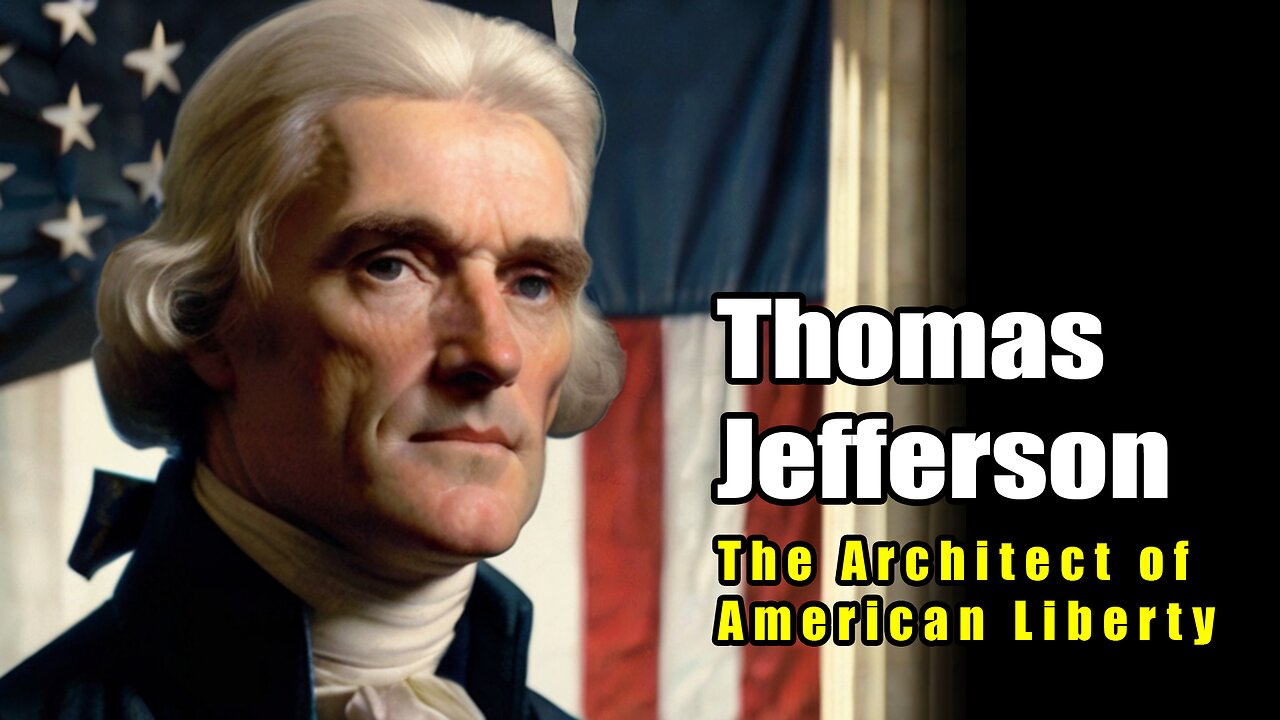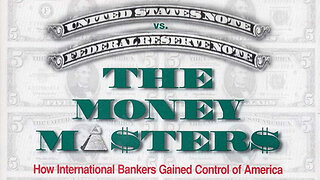Premium Only Content

Thomas Jefferson - The Architect of American Liberty (1743 - 1826)
Thomas Jefferson (1743-1826) was a key figure in American history and one of the Founding Fathers of the United States. He played a crucial role in the drafting of the Declaration of Independence and served as the third President of the United States. Jefferson is often remembered for his contributions to American political philosophy, his architectural endeavors, and his commitment to individual liberty. Here is an overview of Thomas Jefferson's life and legacy:
Early Life:
Born in Virginia:
Thomas Jefferson was born on April 13, 1743, in Shadwell, Virginia, into a wealthy and influential family.
Education:
He attended the College of William and Mary in Virginia, where he studied law, philosophy, and the sciences.
Political Career:
Virginia House of Burgesses:
Jefferson entered politics and was elected to the Virginia House of Burgesses in 1769. He became known for his eloquent writing and support for colonial rights.
Declaration of Independence:
In 1776, Jefferson was appointed to the Continental Congress and played a central role in drafting the Declaration of Independence. His eloquent words emphasized the natural rights of individuals.
Post-Revolutionary Period:
Governor of Virginia:
Jefferson served as the Governor of Virginia from 1779 to 1781 during a critical period in the Revolutionary War.
Virginia Statute for Religious Freedom:
Jefferson authored the Virginia Statute for Religious Freedom in 1779, which became a precursor to the First Amendment of the U.S. Constitution.
Architect and Innovator:
Monticello:
Jefferson was an accomplished architect, and his home, Monticello, is a masterpiece of neoclassical design. It reflects his interest in classical architecture and innovative ideas.
University of Virginia:
Jefferson founded the University of Virginia in 1819, conceptualizing and designing its campus, known for its architectural significance.
Presidency:
Third President of the United States:
Jefferson served as the third President from 1801 to 1809. His presidency is often associated with the Louisiana Purchase, which significantly expanded the United States.
Lewis and Clark Expedition:
Jefferson sponsored the Lewis and Clark Expedition (1804-1806), which explored the newly acquired western territories and contributed to geographical knowledge.
Legacy:
Advocate for Liberty:
Jefferson is celebrated as an advocate for individual liberty, limited government, and the pursuit of happiness. His writings, including the Declaration of Independence, are foundational to American political thought.
Founder of Democratic-Republican Party:
Jefferson co-founded the Democratic-Republican Party and strongly believed in states' rights and agrarian ideals.
Retirement:
After his presidency, Jefferson retired to Monticello, where he continued to correspond with political leaders and intellectuals. He also engaged in agricultural and scientific pursuits.
Controversies:
Slavery:
Despite his commitment to liberty, Jefferson's ownership of slaves, including a relationship with Sally Hemings, remains a controversial aspect of his legacy.
Embargo Act:
The Embargo Act of 1807, enacted during Jefferson's presidency, was an unpopular policy intended to protect American interests but resulted in economic hardship.
Death:
July 4, 1826:
Thomas Jefferson died on July 4, 1826, exactly 50 years after the signing of the Declaration of Independence. Coincidentally, John Adams, the second U.S. President, also died on the same day.
Conclusion:
Thomas Jefferson's multifaceted contributions as a statesman, philosopher, architect, and president have left an enduring impact on American history. While his legacy includes significant achievements, it is also marked by complexities and contradictions that continue to be subjects of historical analysis and discussion. Jefferson's emphasis on individual rights and democratic principles remains integral to the American identity.
-
 2:38:38
2:38:38
TimcastIRL
4 hours agoTrump Orders DOJ To FIRE EVERY Biden Attorney, Calls For CLEAN HOUSE w/Siaka Massaquoi | Timcast IRL
95.8K60 -
 1:29:31
1:29:31
Glenn Greenwald
7 hours agoGermany's Repressive Speech Crackdown Intensifies; U.S. & Russia Meet in Saudi Arabia and Open Cooperation; Plus: An Amazing Hate Crime in Florida is Buried | SYSTEM UPDATE #408
72.1K53 -

DLDAfterDark
1 hour ago $0.51 earnedDLD Live! What's Your Typical EDC/Civilian Load Out? Guns & Ammo & EDC?
4.91K -
 1:30:48
1:30:48
Redacted News
8 hours agoBREAKING! TRUMP AND PUTIN NEARING PEACE BUT EUROPEAN WARMONGERS TRYING TO STOP IT | REDACTED
149K231 -
 52:40
52:40
Candace Show Podcast
8 hours agoSaturday Night Lively: What Were They Thinking? | Candace Ep 148
132K145 -
 LIVE
LIVE
Man in America
3 hours agoDocumentary: The Money Masters 'How International Bankers Gained Control of America'
1,497 watching -
 1:10:40
1:10:40
PMG
1 day ago $0.79 earnedTom Hanks Plays a Racist MAGA Supporter On SNL!! UNBELIEVABLE
11K1 -
 2:11:29
2:11:29
Adam Does Movies
7 hours ago $1.11 earnedAsk Me Anything - Live!
20K -
 56:18
56:18
Flyover Conservatives
23 hours agoFollow the Money: $4.7 Trillion in Government Fraud EXPOSED!; Flu Shots, Fear & Big Pharma Lies—What They DON’T Want You to Know - Dr. Stella Immanuel | FOC Show
25.3K -
 1:16:24
1:16:24
Anthony Rogers
1 day agoEpisode 354 - Current Events, Weather, and Other Clickbait
29.5K1